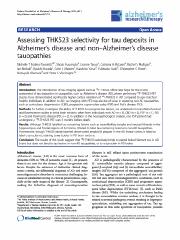Please use this identifier to cite or link to this item:
https://ahro.austin.org.au/austinjspui/handle/1/12096| Title: | Assessing THK523 selectivity for tau deposits in Alzheimer's disease and non-Alzheimer's disease tauopathies. | Austin Authors: | Fodero-Tavoletti, Michelle T;Furumoto, Shozo;Taylor, Leanne;McLean, Catriona A;Mulligan, Rachel S ;Birchall, Ian;Harada, Ryuichi;Masters, Colin L ;Yanai, Kazuhiko;Kudo, Yukitsuka;Rowe, Christopher C ;Okamura, Nobuyuki;Villemagne, Victor L | Affiliation: | The Florey Institute of Neuroscience and Mental Health, 30 Royal Parade, Parkville, 3052 Melbourne, Victoria, Australia ; Department of Nuclear Medicine & Centre for PET, Austin Health, 145 Studley Road, Heidelberg, 3084 Melbourne, Victoria, Australia Department of Nuclear Medicine & Centre for PET, Austin Health, 145 Studley Road, Heidelberg, 3084 Melbourne, Victoria, Australia The Florey Institute of Neuroscience and Mental Health, 30 Royal Parade, Parkville, 3052 Melbourne, Victoria, Australia Department of Anatomical Pathology, The Alfred Hospital, Monash University, Melbourne, Australia Department Pharmacology, Tohoku University School of Medicine, Sendai, Japan. Innovation of New Biomedical Engineering Center, Tohoku University, Sendai, Japan. |
Issue Date: | 26-Feb-2014 | Publication information: | Alzheimer's Research & Therapy 2014; 6(1): 11 | Abstract: | The introduction of tau imaging agents such as (18)F-THK523 offers new hope for the in vivo assessment of tau deposition in tauopathies such as Alzheimer's disease (AD), where preliminary (18)F-THK523-PET studies have demonstrated significantly higher cortical retention of (18)F-THK523 in AD compared to age-matched healthy individuals. In addition to AD, tau imaging with PET may also be of value in assessing non-AD tauopathies, such as corticobasal degeneration (CBD), progressive supranuclear palsy (PSP) and Pick's disease (PiD).To further investigate the ability of THK523 to recognize tau lesions, we undertook immunohistochemical and fluorescence studies in serial brain sections taken from individuals with AD (n = 3), CBD (n = 2), PSP (n = 1), PiD (n = 2) and Parkinson's disease (PD; n = 2). In addition to the neuropathological analysis, one PSP patient had undergone a (18)F-THK523 PET scan 5 months before death.Although THK523 labelled tau-containing lesions such as neurofibrillary tangles and neuropil threads in the hippocampus and frontal regions of AD brains, it failed to label tau-containing lesions in non-AD tauopathies. Furthermore, though THK523 faintly labelled dense-cored amyloid-β plaques in the AD frontal cortex, it failed to label α-synuclein-containing Lewy bodies in PD brain sections.The results of this study suggest that (18)F-THK523 selectively binds to paired helical filament tau in AD brains but does not bind to tau lesions in non-AD tauopathies, or to α-synuclein in PD brains. | URI: | https://ahro.austin.org.au/austinjspui/handle/1/12096 | DOI: | 10.1186/alzrt240 | Journal: | Alzheimer's research & therapy | URL: | https://pubmed.ncbi.nlm.nih.gov/24572336 | Type: | Journal Article |
| Appears in Collections: | Journal articles |
Files in This Item:
| File | Description | Size | Format | |
|---|---|---|---|---|
| 24572336.pdf | 1.6 MB | Adobe PDF |  View/Open |
Page view(s)
100
checked on Apr 30, 2025
Download(s)
100
checked on Apr 30, 2025
Google ScholarTM
Check
Items in AHRO are protected by copyright, with all rights reserved, unless otherwise indicated.
